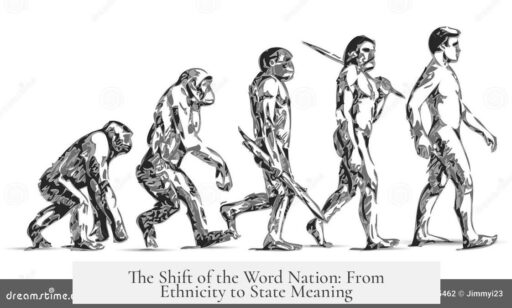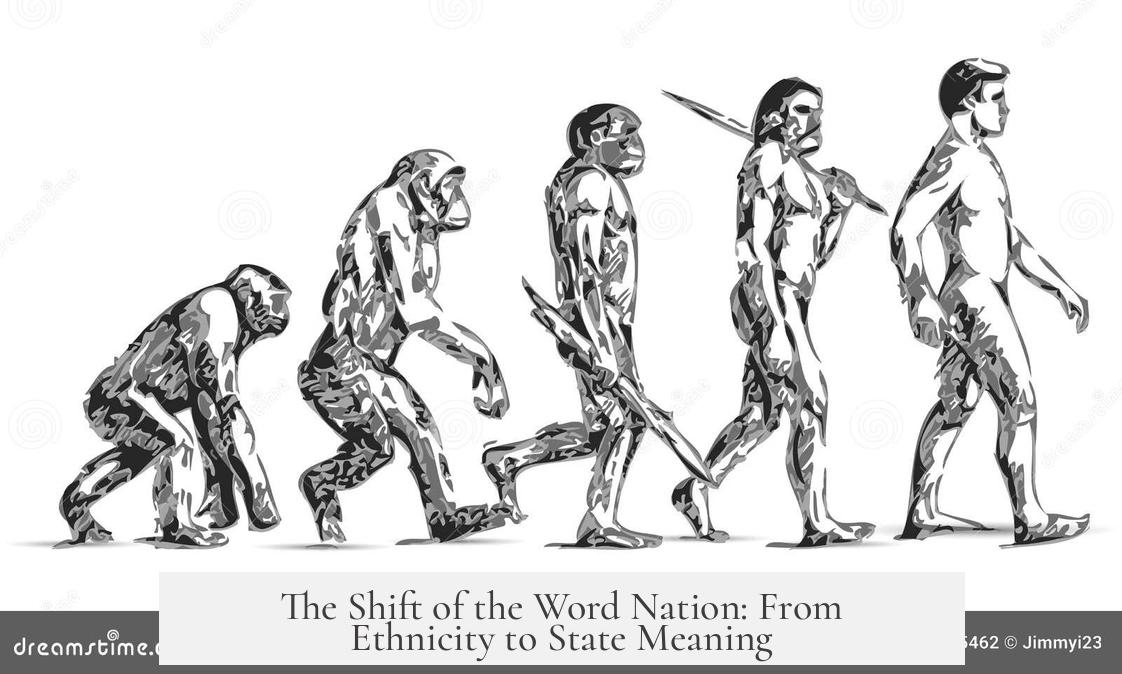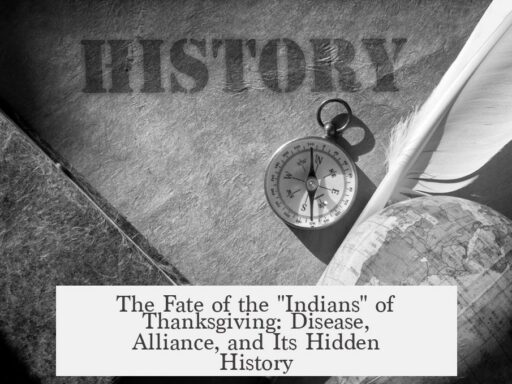The word “nation” originally referred to a group of people sharing common ethnicity and history. Over time, especially during the industrial era, its meaning shifted toward signifying a state or country. This change links closely to the rise of the nation-state concept and government-centered national identity.
Historically, “nation” described ethnic or cultural groups united by language, ancestry, and tradition. This meaning still holds in many contexts today. However, from the 18th and 19th centuries onward, the term began to be used interchangeably with “country” or “state,” reflecting political sovereignty.
This shift is tied to the emergence of the nation-state, a political entity where a homogeneous nation governs a defined territory under a centralized government. The industrial era played a crucial role in this transformation. Governments started standardizing language use and historical narratives through education, fostering distinct national identities linked to political borders.
For example, people living near the France-Spain border in the Middle Ages might share language and customs. By the industrial era, they learned different national histories and languages, identifying separately as French or Spanish. This solidified the notion of nation as a political-territorial entity rather than merely an ethnic group.
It is important to note that not all nations have their own states, and not all states represent a single nation. The term “nation-state” precisely captures the overlap of national identity and sovereign governance. The contraction of this longer expression to “nation” in everyday language led to the word’s modern political sense.
| Period | Meaning of “Nation” | Key Factor |
|---|---|---|
| Pre-Industrial Era | Ethnic group sharing language, culture, history | Common ancestry and tradition |
| Industrial Era Onward | Political entity or country (nation-state) | Centralized education, national histories, political sovereignty |
- The original meaning focuses on shared ethnicity and culture.
- The industrial era popularized the nation-state idea.
- Education standardized national languages and histories.
- Language use shifted to equate nation with state or country.
- Not all nations control states, and not all states fit one nation.
When Did the Word Nation Change from Meaning “Ethnicity” to Meaning “State”?
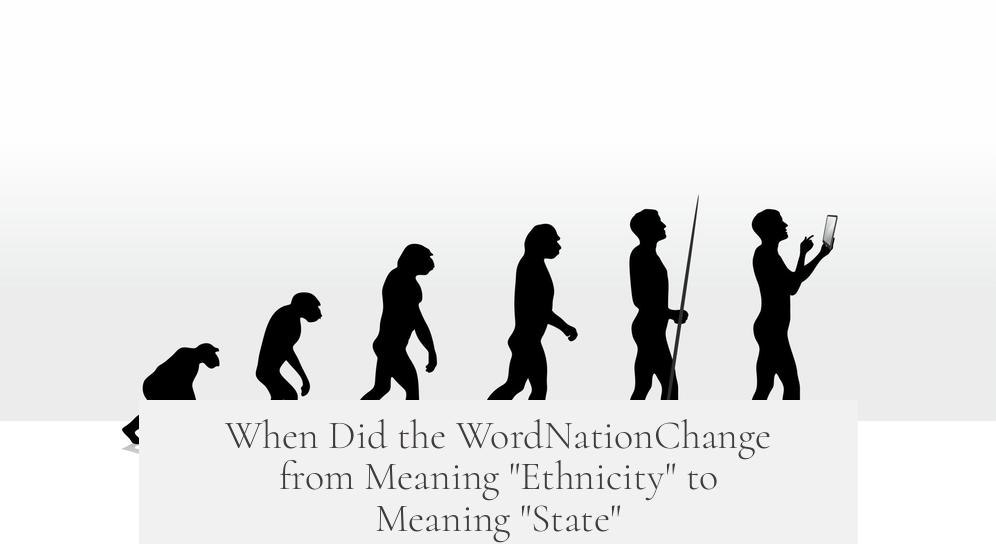
The word nation originally meant a group of people bound by ethnicity and history. Over time, especially during the industrial era with the rise of centralized governments and standard education, it began to be used also as shorthand for a political entity or state — in other words, the modern nation-state.
That shift from a purely ethnic or cultural meaning to a political and territorial one is subtle but crucial. Let’s explore how and when this change took place.
Ethnicity and Nation: The Original Meaning
For many centuries, nation primarily referred to an ethnic group sharing a common language, culture, and history. Think of it as a tribe or people connected by shared heritage—bound by stories, customs, and bloodlines.
This definition still holds true for many scholars and communities today. The term nation isn’t simply interchangeable with country or state; it represents something deeper.
For example, the First Nations peoples in Canada are distinct nations. So are the Québécois, who share a unique French-Canadian heritage. Neither controls a nation-state, yet both are nations in their own right.
Introducing the Nation-State: A New Twist on an Old Word
The modern notion of a nation-state emerged later. A nation-state means a sovereign political entity where the boundaries of a state and of a nation coincide—or at least aspire to. It’s when an ethnic group or “nation” governs itself within defined borders.
But reality is messier. Not all nations have their own states, and not all states are nation-states in the ethnic sense.
For example, Canada doesn’t present itself as a nation-state in the ethnic sense. It’s more a confederation or country composed of multiple nations and peoples, which contrasts with states like Japan or Portugal, where ethnic homogeneity is stronger and a clearer link between the people and the state exists.
So When Did Nation Start Meaning “State”?
The shift began principally during the industrial era. Think 18th to 19th centuries, when Europe’s political and social landscape underwent a seismic change.
This era saw the rise of centralized governments that standardized public life—especially education. Standardized languages and histories became tools of nation-building.
Picture two people living near the France-Spain border in the Middle Ages. They might share similar languages and customs. But by the industrial revolution, children on either side of that border were taught different national histories and languages, shaping distinct national identities. Suddenly, “French” and “Spanish” became more than ethnic terms; they became political ones too.
This education system’s role was crucial. By teaching a uniform history and language, governments created a shared sense of belonging not only based on ethnicity but also on allegiance to the state.
Why Did This Change Matter?
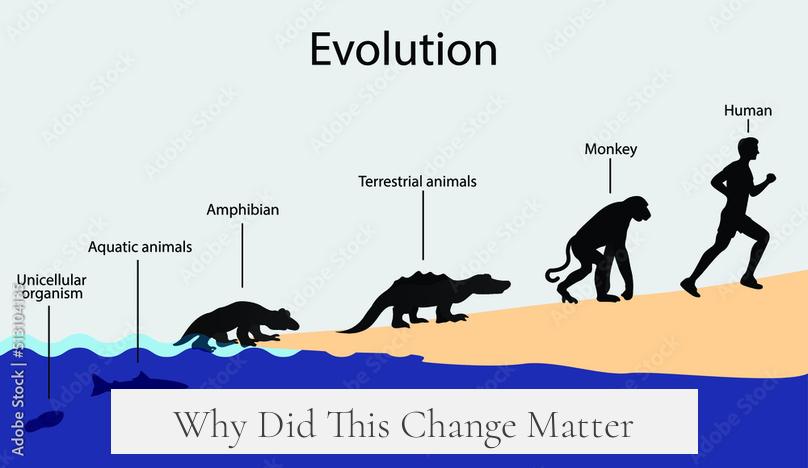
The change affected how people view themselves and their world. The word nation now came loaded with political weight. To call a place a “nation” now implied it could, or should, govern itself.
For instance, before this shift, loyalty might have been to a tribe or ethnic group. Afterward, loyalty increasingly meant allegiance to a nation-state—a new political community defined by laws and borders.
This evolution ties deeply to modern nationalism. Nationalism isn’t just pride in culture, but also a political ideology that promotes sovereignty and self-rule for that nation.
Some Modern Examples: Native Nations within States
Canada is often called a “nation” in everyday talk, but technically, it’s a state hosting many nations. The First Nations peoples inside Canada identify distinctly as nations in the ethnic and cultural sense.
This example highlights how nation still primarily means ethnicity and cultural heritage. Only in certain contexts does the term extend to mean a state itself.
Lessons and Insights from the Nation/State Journey
- Words matter: The meaning of “nation” adapted to political realities, showing language’s fluidity.
- Identity is complex: People might identify by ethnicity, state, or both, depending on historical context.
- Education shaped perceptions: History and language taught by states create new senses of belonging.
How to Understand This Today?
If someone calls a place a “nation,” ask: Do they mean an ethnic community or a sovereign state? Both meanings exist, but knowing the origin clarifies that nation as “state” is a relatively recent and politically charged use.
Keep an eye on contexts, especially when reading or hearing about nationhood in multiethnic countries. It’s common for groups inside one state to claim distinct nationhood based on ethnicity, culture, and history.
The Bottom Line
So, when did the meaning of “nation” evolve? The shift started during the 18th and 19th centuries, driven by industrialization, centralized state power, and standardized schooling. Gradually, “nation” took on the meaning of a sovereign state or political community.
Yet, the original sense of a nation as an ethnic and cultural group persists, creating a rich, sometimes tricky blend of meanings today.
Isn’t it fascinating how one word can reflect centuries of history, politics, and identity struggles? What’s your nation’s story—is it more about shared blood or shared borders?
When did the word “nation” begin to mean “state” instead of just “ethnicity”?
The shift occurred during the industrial era. Language and history education became standardized by central governments. This changed how people identified, linking nations with defined states.
What caused the change in the meaning of “nation” from ethnicity to state?
Standardized schooling by governments taught different languages and histories. This broke old ethnic bonds and created loyalty to distinct political states instead.
Is a nation the same as a nation-state?
No. A nation can mean a shared ethnic group. A nation-state is a sovereign state that represents such a group. Many nations lack their own states.
Did the meaning of “nation” change suddenly or gradually?
The change was gradual. Over centuries, especially from the industrial period onward, the focus shifted from ethnic identity to political and territorial identity.
Why did people near borders like France and Spain start seeing themselves as different nations?
Because schooling taught them different languages and national histories. This made them identify as separate nations tied to specific states despite ethnic similarities.
